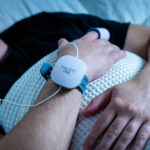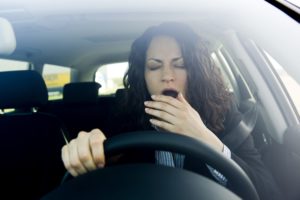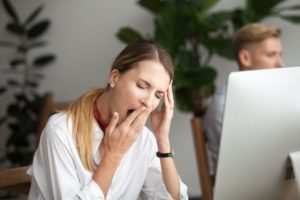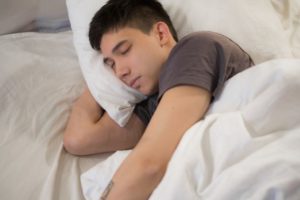When you buy through our links, we may earn a commission. Products or services may be offered by an affiliated entity. Learn more.
Excessive Sleepiness and Workplace Accidents
If you feel that you are not getting enough sleep at night or are overly tired during the day, you are not alone. Medical experts recommend that adults should aim to get seven or more hours of sleep per night. However, data shows that many Americans regularly get less than the necessary hours. Insufficient sleep is one major cause of excessive daytime sleepiness, which is thought to affect up to 25% of the U.S. population.
A lack of sleep impacts both physical and mental health. In the workplace, excessive sleepiness can greatly increase the likelihood of a workplace accident, which can result in injury and even death. Sleep deprivation also has a significant impact on other aspects of job performance, including productivity, task management, and meeting goals.
Struggling to Stay Awake? Take an At-Home Sleep Test
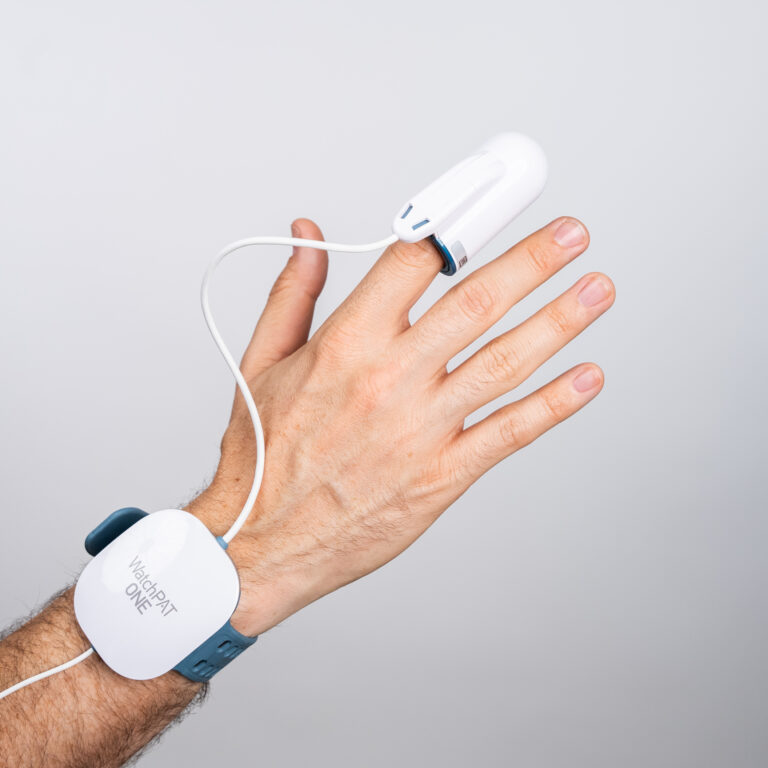
our partner at sleepdoctor.com
10% off Home Sleep Tests
Buy Now“Truly grateful for this home sleep test. Fair pricing and improved my sleep!”
Dawn G. – Verified Tester
The Relationship Between Sleep Deprivation and Workplace Accidents
There is overwhelming evidence demonstrating that sleep deprivation leads to workplace accidents. Overly sleepy employees are 70% more likely to be involved in workplace accidents than colleagues who are not sleep deprived. Long work hours paired with poor sleep quality can also contribute to a higher risk of workplace injury. Workers with insomnia are much more likely to have work-related accidents than those who do not have sleep disorders.
These workplace accidents can have serious consequences. In a Swedish study of over 50,000 workers, those who self-reported disturbed sleep were twice as likely to die in an accident related to the workplace.
How Does Lack of Sleep Increase the Risk of Workplace Accidents?
Sleep deprivation degrades cognitive processing , affecting everything from memory to reflexes. With less sleep, your reaction time slows. This means you make decisions less quickly and accurately . You are also more likely to misjudge your own abilities and take unwise risks. As a result, excessive sleepiness can lead to consequential errors and accidents that gravely impact the workplace.
Industries Where Sleepiness Impacts Safety
In many industries, a lack of sleep is an enormous safety issue. Sleep deprivation in pilots, truck drivers, shift workers, and medical residents, for instance, leads to an increased risk of dangerous errors.
Sleep-deprived workers who drive as a part of their job are particularly in danger of drowsy driving, which can also have serious consequences. Drivers who get six hours of sleep or less are 33% more likely to have an accident on the road, compared to those who get seven or eight hours of sleep. Driving while sleep deprived has the same or worse impact as driving with a blood alcohol concentration (BAC) of 0.05% . For comparison, the federal legal BAC while driving in the United States is 0.08% , and some states have lower limits.
Health care workers are also at risk of drowsiness impacting their work, especially because they tend to work long shifts or work overnight. A study of 100 nurses revealed that cognitive performance was significantly impaired in night shift workers demonstrating, for instance, that nurses working the night shift made 32% more mathematical errors than nurses working the day shift. This was attributed to poor sleep quality and decreased alertness.
Stories of Workplace Accidents Caused by Sleepiness
Several infamous workplace accidents were directly and indirectly caused by excessive sleepiness or sleep deprivation.
- Three Mile Island Nuclear Plant: In 1979, the worst commercial nuclear plant incident in the history of the United States occurred at the Three Mile Island Nuclear Plant in Pennsylvania. The incident occurred when shift workers working between 4 a.m. and 6 a.m failed to recognize a serious change that nearly resulted in the meltdown of the nuclear reactor later that day.
- Chernobyl Nuclear Power Plant: The 1986 catastrophe at the Chernobyl Nuclear Power Plant began at 1:23 a.m. because of human error. It was later found that the operators responsible were working on too little sleep.
- Other nuclear plants: Other nuclear plants have histories of failures caused in part by sleepiness. In 2002, the Davis-Besse Reactor near Oak Harbor, Ohio went into shutdown at 1:35 a.m., and in 1978, the Rancho Seco nuclear reactor near Sacramento, California lost power to the control system at 4:14 a.m.
- Exxon Valdez oil spill:Excessive work hours and sleep deprivation were major contributing factors to the grounding of the Exxon Valdez oil tanker, which led to the 1989 oil spill in Prince William Sound.
- Space Shuttle Challenger explosion: Because of a lack of sleep and sleep-deprived shiftwork, poor judgments were made when launching the Challenger Space Shuttle in 1986. According to reports, crucial managers had been working since 1 a.m. the day of the explosion, and they slept less than two hours the previous night.
What Other Issues Does Sleep Deprivation Cause in the Workplace?
In addition to workplace accidents resulting in injury or death, a number of other issues can arise in the workplace due to sleep deprivation.
- Time off: Every year, the United States loses 1.23 million working days due to insufficient sleep. When compared to those who get sufficient sleep, sleep-deprived workers are twice as likely to miss work.
- Interpersonal conflict:. Without sufficient sleep, people can become irritable, easily frustrated, anxious, and depressed . These changes can lead to poor communication or team difficulties.
- Decreased performance: Sleep-deprived employees have more difficulty performing in the workplace. They also have decreased concentration compared to their peers. This can impact both individual and group performance.
- Financial costs: These productivity and missed work costs add up. In 2015, it was estimated that losses related to sleep deprivation cost the United States between $280 billion and $411 billion, or between 1.56% to 2.28% of the country’s gross domestic product (GDP).
Both inside and outside of the workplace, sleep deprivation and poor sleep quality have adverse effects on overall physical and mental health. Education on sleep and attention to sleep hygiene are crucial steps to improving sleep, bettering health, and promoting safety in and out of the workplace.

Still have questions? Ask our community!
Join our Sleep Care Community — a trusted hub of product specialists, sleep health professionals, and people just like you. Whether you’re searching for the perfect mattress or need expert sleep advice, we’ve got you covered. Get personalized guidance from the experts who know sleep best.
References
13 Sources
-
Consensus Conference Panel, Watson, N. F., Badr, M. S., Belenky, G., Bliwise, D. L., Buxton, O. M., Buysse, D., Dinges, D. F., Gangwisch, J., Grandner, M. A., Kushida, C., Malhotra, R. K., Martin, J. L., Patel, S. R., Quan, S. F., Tasali, E., Non-Participating Observers, Twery, M., Croft, J. B., Maher, E., … Heald, J. L. (2015). Recommended amount of sleep for a healthy adult: A joint consensus statement of the American Academy of Sleep Medicine and Sleep Research Society. Journal of Clinical Sleep Medicine, 11(6), 591–592.
https://pubmed.ncbi.nlm.nih.gov/25979105/ -
Institute of Medicine (US) Committee on Sleep Medicine and Research. (2006). Functional and economic impact of sleep loss and sleep-related disorders. In H. R. Colten & B. M. Altevogt (Eds.), Sleep disorders and sleep deprivation: An unmet public health problem (pp. 137–172). National Academies Press (US).
https://www.ncbi.nlm.nih.gov/books/NBK19958/ -
Léger, D., Guilleminault, C., Bader, G., Lévy, E., & Paillard, M. (2002). Medical and socio-professional impact of insomnia. Sleep, 25(6), 625–629.
https://pubmed.ncbi.nlm.nih.gov/12224841/ -
Goel, N., Rao, H., Durmer, J. S., & Dinges, D. F. (2009). Neurocognitive consequences of sleep deprivation. Seminars in neurology, 29(4), 320–339.
https://pubmed.ncbi.nlm.nih.gov/19742409/ -
Workplace Health Resource Center. (2018). Sleep: An important health and safety concern at work. Centers for Disease Control and Prevention., Retrieved April 4, 2023, from
https://blogs.cdc.gov/niosh-science-blog/2012/03/08/sleep-and-work/ -
Gottlieb, D. J., Ellenbogen, J. M., Bianchi, M. T., & Czeisler, C. A. (2018). Sleep deficiency and motor vehicle crash risk in the general population: A prospective cohort study. BMC Medicine, 16(1), 44.
https://pubmed.ncbi.nlm.nih.gov/29554902/ -
Williamson, A. M., & Feyer, A. M. (2000). Moderate sleep deprivation produces impairments in cognitive and motor performance equivalent to legally prescribed levels of alcohol intoxication. Occupational and environmental medicine, 57(10), 649–655.
https://pubmed.ncbi.nlm.nih.gov/10984335/ -
National Center for Injury Prevention and Control. (2022, December 22). Impaired driving: Get the facts. Centers for Disease Control and Prevention., Retrieved April 3, 2023, from
https://cdctransportation.org/www.cdc.gov/transportationsafety/impaired_driving/impaired-drv_factsheet.html -
Kaliyaperumal, D., Elango, Y., Alagesan, M., & Santhanakrishanan, I. (2017). Effects of sleep deprivation on the cognitive performance of nurses working in shift. Journal of Clinical and Diagnostic Research, 11(8), CC01–CC03.
https://pubmed.ncbi.nlm.nih.gov/28969117/ -
Mitler, M. M., Carskadon, M. A., Czeisler, C. A., Dement, W. C., Dinges, D. F., & Graeber, R. C. (1988). Catastrophes, sleep, and public policy: Consensus report. Sleep, 11(1), 100–109.
https://pubmed.ncbi.nlm.nih.gov/3283909/ -
State of Alaska, Alaska Oil Spill Commission. (1990 February). SPILL: The wreck of the Exxon Valdez. Final Report.
https://evostc.state.ak.us/oil-spill-facts/details-about-the-accident/ -
Hafner, M., Stepanek, M., Taylor, J., Troxel, W. M., & van Stolk, C. (2017). Why Sleep Matters-The Economic Costs of Insufficient Sleep: A Cross-Country Comparative Analysis. Rand health quarterly, 6(4), 11.
https://pubmed.ncbi.nlm.nih.gov/28983434/ -
Chattu, V. K., Manzar, M. D., Kumary, S., Burman, D., Spence, D. W., & Pandi-Perumal, S. R. (2018). The global problem of insufficient sleep and its serious public health implications. Healthcare (Basel, Switzerland), 7(1), 1.
https://pubmed.ncbi.nlm.nih.gov/30577441/



